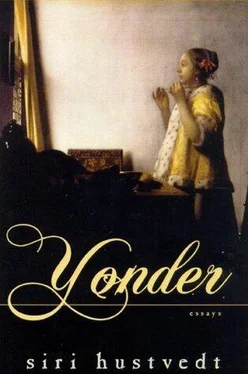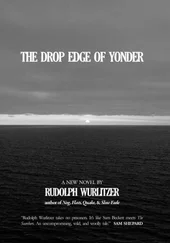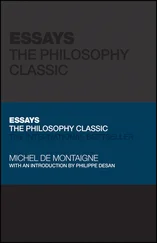The role of the onlooker is given quasi-supernatural status in the book in the form of the bespectacled eyes of T. J. Eckleburg, and it is to this faded billboard of an oculist in Queens that the grieving Wilson addresses his prayer: “You can’t hide from God.” When his friend tells him, “That’s an advertisement,” Wilson doesn’t answer. The man needs an omniscient third person, and he finds it in Eckleburg, with his huge staring eyes. This speech occurs when Nick is not present, and yet the quality of the narration does not change. It is as if he were present. Nick’s stand-in is a neighbor of Wilson’s, Michaelis, who has presumably reported the scene to the narrator, but the reader isn’t told this directly. Together, Michaelis and Nick Carraway form a complementary narration that finds transcendence in the image of Eckleburg’s all-seeing, all-knowing eyes, a figure very like the third-person narrator of nineteenth-century novels who looks down on his creatures and their follies.
There is only one other noticeable pair of spectacles in the novel, those worn by “the owl-eyed man.” One of Gatsby’s hundreds of anonymous guests, he is first seen in the “Gothic library,” a drunken fellow muttering excitedly that the books “are absolutely real.” He had expected cardboard, he tells Nick and Jordan, and cannot get over his astonishment at the reality of these volumes. The owl-eyed man returns near the end of the book as Gatsby’s only mourner besides the dead man’s father and Nick. Like the image of Eckleburg, the owl-eyed man is both thoroughly mysterious and thoroughly banal. He tells Nick and Jordan that he’s been drunk for a week and that he thought the books might help “sober” him up. Nameless, the man is associated exclusively with the library and his large glasses. Nick does not ask the owl-eyed man to attend the funeral. He has kept the day and place a secret to avoid gawkers and the press, but, out of nowhere, the man makes his appearance in the rain, and during that time he removes his glasses twice. The second time, he wipes them, “outside and in.” I can see him doing it. For me the gesture is intimate, and although no handkerchief is mentioned, I see a white handkerchief, too, moving over the rain-spattered lenses. The cleaning of the glasses is ordinary and magical. The strange man is a second, specifically literary incarnation of Eckleburg, a witness to the problem of what’s real and what isn’t, a problem that is turned inside out through the idea of seeing through special glasses —the glasses of fiction.
The Great Gatsby is an oddly immaterial novel. In it there are only two characters with bodies that mean anything, bodies of vigor and appetite: Tom Buchanan and his mistress, Myrtle Wilson, whose alliance causes the book’s tragedy. The rest of them, Gatsby, the hordes of guests, Jordan, and, above all, Daisy, seem to be curiously unanchored to the ground. They are pastel beings, beings of light and sound — creatures of the imagination. At Gatsby’s parties, “men and girls” come and go “like moths,” accompanied by an orchestra as if they were characters in a play or a movie. When Nick first sees Daisy and Jordan in East Egg, the girls are reclining on a huge sofa. “They were both in white, and their dresses were rippling and fluttering as if they had just been blown back in after a short flight around the room.” They are as weightless as dollar bills, or maybe hundred dollar bills, blown up in a wind before they settle again to the ground, and whether or not Fitzgerald intended this lightness as another image of money in his novel, money is the source of the charm that envelops the ethereal creatures. Daisy’s music is her own “thrilling” voice, and it sounds, as Gatsby says, “like money.” But Nick is the one who elaborates on its timbre. In it he hears the jingle of coins and the rain of gold in fairy tales.
It may be that New York and its environs is the best place in the world to feel this particular bewitchment that all the pieties about honest poverty cannot disperse. Fitzgerald is right. Money in the Midwest may be respectable and it may even be considerable, but it is nothing like New York money. There was no money where I grew up, no “real” money, that is. The turkey farmers did well, and the dentists in town had a certain affluent shine to them, but, on the whole, status was measured in increments — a new economy car, unused skates, an automatic garage door — opener — and there was a feeling that it was wrong to have much more money than anybody else, and downright sinful to flaunt it if you had it. When I arrived in New York, the money I saw flabbergasted me. It sashayed on Fifth Avenue and giggled in galleries and generally showed itself off with such unabashed glee that it was impossible not to admire it or envy it, at least a little. And what I saw during my travels through the city in the early 1980s was no different from what Nick saw. Money casts a glow over things, a glow all the more powerful to people who haven’t got it. No matter how clean or morally upright, poverty has cracks and corners of ugliness that nothing but money can close, and I remember the sense of relief and pleasure that would come over me when I sat in a good restaurant with white tablecloths and shining silver and flowers, and I knew that my date was a person who could afford to pay. And it happened during my lonely, impoverished student days that a man would lean across the table and invite me to an island or to another country or to a seaside resort, to an East Egg or a West Egg, and the truth was that the smell of money would waft over me, its scent like a torpor-inducing drug, and had there been no Middle West, no Northfield, Minnesota, no home with its strident Lutheran sanctions, no invisible parental eyes always watching me — in short: had I been somebody else, I might have been blown off to an Egg in a gust of wind and floated across the beach and out into the Sound to the strains of some foolish but melodic accompaniment.
Gravity is personal history. That is why Nick tells the reader about his family right away. The Carraways have been “prominent well-to-do people for three generations,” three generations founded on the rock of a hard ware business, a business that trades in real things. In the East, Nick trades not in things, as his father does, but in paper, bonds that will generate more paper. Money that makes money. And money has built Gatsby’s castle, a place as unreal as a theater set erected from bills or bonds or “cardboard,” as the owl-eyed man suggests. It is a blur of excess and anonymity as vague as Gatsby’s rumored past — a past we learn in bits and pieces but which is never whole — for he is a man interrupted, a man who has broken from his old life and his parents to become not somebody else so much as “Nobody”—a brilliant cipher. “Mr. Nobody from Nowhere” is Tom Buchanan’s contemptuous expression. Gatsby’s connections to others are tenuous or fabricated. He misrepresents himself to Daisy when he first meets her in Louisville, by implying that he comes from her world. Again the image of wind appears in Fitzgerald’s prose. “As a matter of fact, he had no comfortable family standing behind him, and he was liable at the whim of an impersonal government to be blown anywhere about the world.”
But in this ephemeral weightlessness of Gatsby’s there is beauty, real beauty, and on this the whole story turns. The man’s monstrous accumulation of things is nothing if not vulgar, a grotesque display as pitiful as it is absurd. But what Nick understands, as nobody else does, is that this mountain of things is the vehicle of a man’s passion, and as objects they are nearly drained of material reality. The afternoon when Gatsby takes Daisy through his house, we are told that he “stares at his possessions in a dazed way, as though in her actual and astounding presence, none of it was any longer real.” His nerves running high, the owner of the property begins pulling shirts from his closet, one gauzy, gorgeous article after another, “in coral and apple-green and lavender and faint orange, with monograms of Indian blue,” piling them high before Nick and his beloved. Then Daisy bends her lovely head and weeps into the shirts. “It makes me sad because I’ve never seen such — such beautiful shirts before.” I marveled again at the power of this passage, which is at once tender and ridiculous. But Fitzgerald lets neither feeling get the upper hand. Daisy pours out the grief of her young love for Gatsby into a heap of his splendid shirts without understanding her own feelings. But she recovers quickly. Sometime later the same afternoon, she stares out the window at pink clouds in a western sky and says to Gatsby, “I’d just like to get one of those pink clouds and put you in it and push you around.” The shirts, the clouds, the dream are colored like a fading rainbow. Gatsby stands at the edge of his lawn and watches the green light across the water from Daisy’s house. The last suit Nick sees him wearing is pink. If your feet are rooted to the ground, you can’t be blown willy-nilly, but you can’t fly up to those rosy clouds either. It’s as simple as that.
Читать дальше












